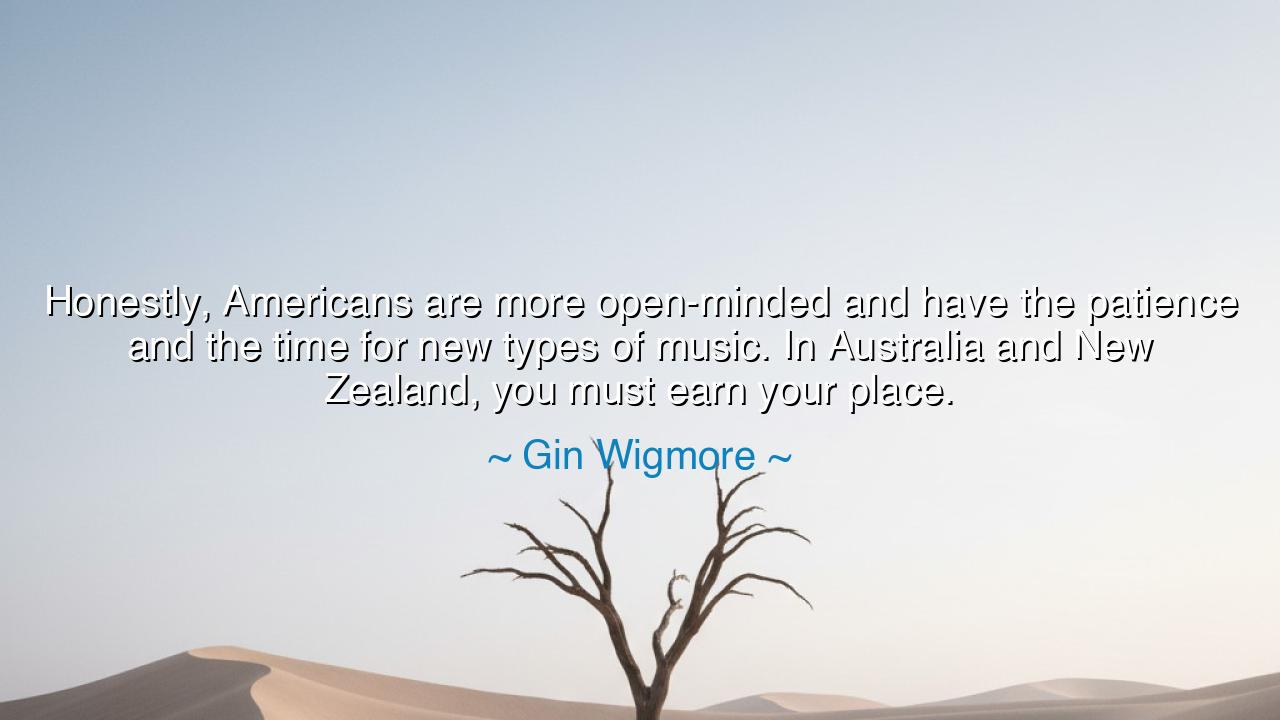
Honestly, Americans are more open-minded and have the patience
Honestly, Americans are more open-minded and have the patience and the time for new types of music. In Australia and New Zealand, you must earn your place.






In the words of Gin Wigmore, singer and storyteller from the southern lands, there is revealed a truth about audiences, culture, and the trials of the artist: “Honestly, Americans are more open-minded and have the patience and the time for new types of music. In Australia and New Zealand, you must earn your place.” Though born from her own journey as a musician, these words echo with deeper meaning: they speak of opportunity and struggle, of receptivity and resistance, of the long road one must walk to prove themselves worthy before their voice is truly heard.
Her words first praise the openness of Americans, who, in their vastness and diversity, often welcome new sounds and forms with curiosity. To them, the unfamiliar is not always feared, but embraced as novelty, as the spark of innovation that might capture their imagination. This is the strength of a people shaped by many cultures: their ears are prepared to hear, and their hearts to accept, even what is foreign or strange. To be an artist in such a land is to find a stage upon which one can dare to be different.
Yet in contrast, she speaks of Australia and New Zealand, her homeland, where the road is harder. There, she says, “you must earn your place.” This is not condemnation but observation, for in smaller nations, the audience is closer, the community tighter, and the standards of belonging more demanding. The artist must not only present themselves but prove themselves—must not only sing but endure the tests of skepticism and loyalty before they are fully embraced. It is a crucible, a fire in which true dedication is tested.
History is filled with such contrasts. Consider the ancient Greeks, whose city of Athens embraced playwrights, philosophers, and sculptors with enthusiasm, birthing new schools of art and thought in rapid succession. In contrast, Sparta, though mighty in arms, resisted novelty in culture and demanded conformity, making it far harder for new forms to survive. One land flourished in innovation because it was open-minded; the other preserved tradition because it demanded proof. Wigmore’s reflection mirrors this eternal balance between the hunger for the new and the protection of the old.
Her words also illuminate the patience required of both artist and audience. In lands that are receptive, the audience is patient enough to allow the unfamiliar to unfold, to let a new song reveal its soul over time. But in lands where proof is demanded, the artist must cultivate their own patience, enduring rejection and silence until their worth is undeniable. Thus, in either case, patience is the crucible of art—whether borne by the listener who waits, or the creator who persists.
The meaning of Wigmore’s statement is therefore not merely about geography, but about the eternal journey of every artist. Sometimes the world greets you with arms wide open, ready to listen. Sometimes it greets you with folded arms and skeptical eyes, demanding you to earn their faith. Both paths are real, and both shape the spirit of the musician, teaching humility, perseverance, and resilience.
The lesson for us is clear: whether in art, work, or life, do not be discouraged by resistance, nor spoiled by easy acceptance. If your audience is open-minded, give them something bold, something worthy of their patience. If your audience demands proof, embrace the test, for it will strengthen your craft and harden your resolve. In both cases, remember that worth is not given—it is revealed through dedication and endurance.
So let Gin Wigmore’s words be remembered as a compass: that some lands are fertile soil for the new, while others are rocky ground that tests the roots of every seed. Both are necessary, for only through openness does creativity soar, and only through testing does authenticity endure. Let the artist, then, sing with courage in both fields, knowing that in the end, every song that survives will carry within it the strength of patience and the fire of truth.






AAdministratorAdministrator
Welcome, honored guests. Please leave a comment, we will respond soon